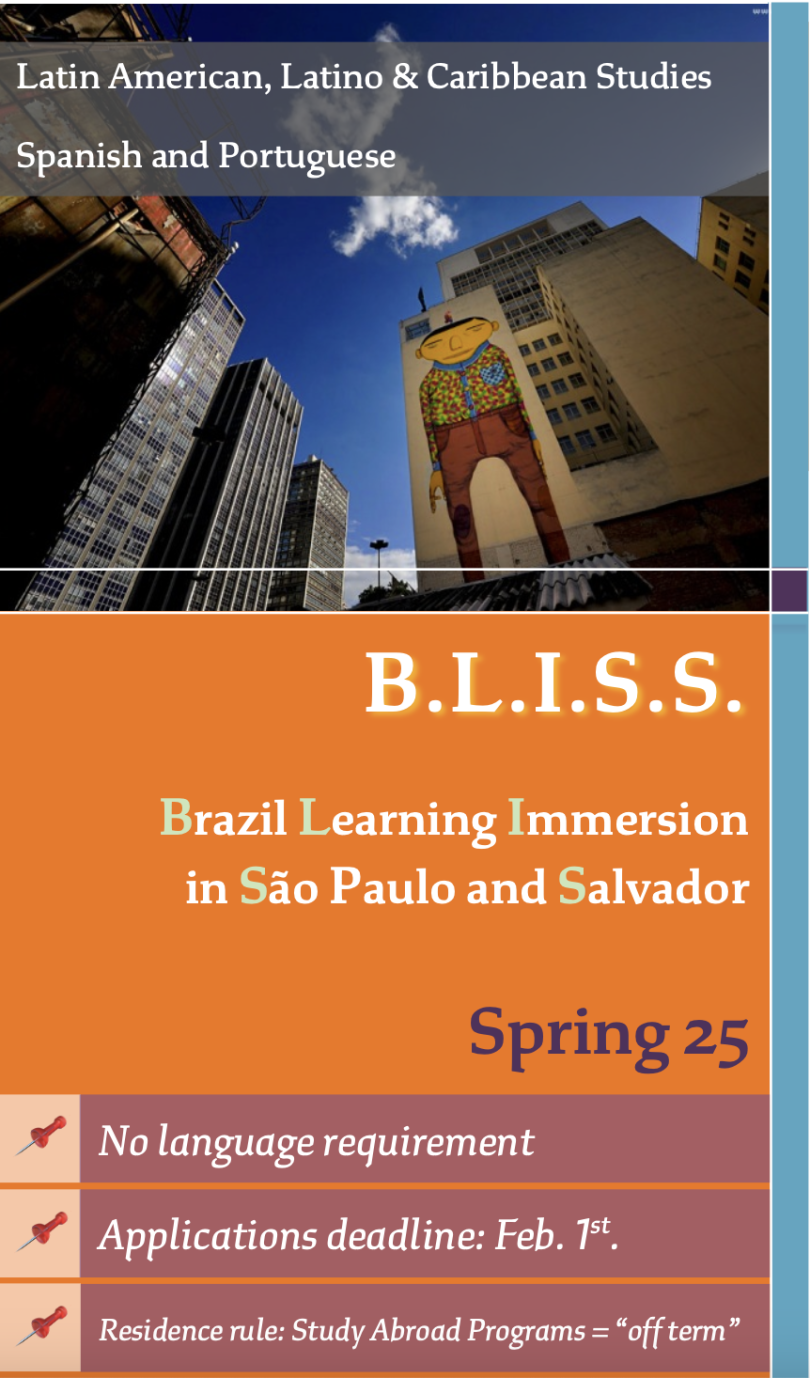
- Undergraduate
- Foreign Study
- Fellowships
- News & Events
- People
Back to Top Nav
Back to Top Nav
Back to Top Nav

Students with and without knowledge of Portuguese can join the program, and native speakers are also welcome.
Applications are open and are due on Feb. 1st https://guarini.dartmouth.edu/programs/brazil-learning-immersion-sao-paulo-and-salvador-bliss
For more information, contact professor Carlos Minchillo: carlos.cortez.minchillo@dartmouth.edu.
The Brazil Learning Immersion in São Paulo and Salvador (BLISS) program is run jointly by the Department of Spanish and Portuguese and the Department of Latin American, Latino & Caribbean Studies. BLISS is an innovative model of study abroad that combines advanced topic courses in English with Portuguese-language course options for all levels, from beginner to native speaker. Therefore, students do not need to have previous knowledge of Portuguese to join the program. Drawing from the social sciences and the humanities, BLISS provides a cross-disciplinary opportunity to study Brazil from multiple angles.
The academic training and experiential components expand and deepen students' knowledge about Latin America and the Lusophone world. Coupled with first-hand experience of living in Brazil, the two-topic courses develop a well-informed and rich understanding of the country's main features, problems, assets, and prospects. Curricular and co-curricular components are designed to complement each other and create a dialogue between classroom work and the surrounding natural, social, and cultural landscapes.
To promote a broader understanding of Brazil's historical, economic, ethnic, and cultural diversity, the program is held in two Brazilian cities. Students spend the first 5 weeks in São Paulo and the last 4 weeks in Salvador, Bahia. The program's project-based courses on urban studies and Afro-Brazilian culture capitalize on the environmental and social richness of each of those cities. This full immersion experience in an authentic cultural context will provide a unique opportunity for students to develop language skills and intercultural competencies.
São Paulo, capital of the homonymous state of São Paulo. Cosmopolitan and vibrant, São Paulo is the largest city in Brazil. It is a hub of business, culture, sports and the arts that appeals to a wide range of tastes and interests. Founded in 1554, São Paulo matured into a culturally diverse city, powerful economically and politically. It was one of the first cities to benefit from the coffee boom in the late 19th century. Soon after, it became the foremost industrial center in Latin America, attracting major waves of domestic migrants and foreign immigrants, particularly Italians, Germans, Japanese, Lebanese, Syrians, Greeks, Chinese and Koreans. Home to top institutions of higher education, São Paulo has a large and diverse population of university students and is Brazil's main center for academic research and professional development.
Salvador offers a unique blend of history, culture, and natural beauty that makes it a fascinating city. The capital of the state of Bahia and one of the oldest colonial cities in the Americas, Salvador is known for its diverse and dynamic culture, influenced by African, European, and indigenous roots. This is evident in its music, dance, art, and religious traditions. The historic center of the city, Pelourinho, is a UNESCO World Heritage site with well-preserved colonial architecture and cobblestone streets. Salvador boasts beautiful urban beaches, such as Porto da Barra and Itapuã, and its cuisine is flavorful and unique.
